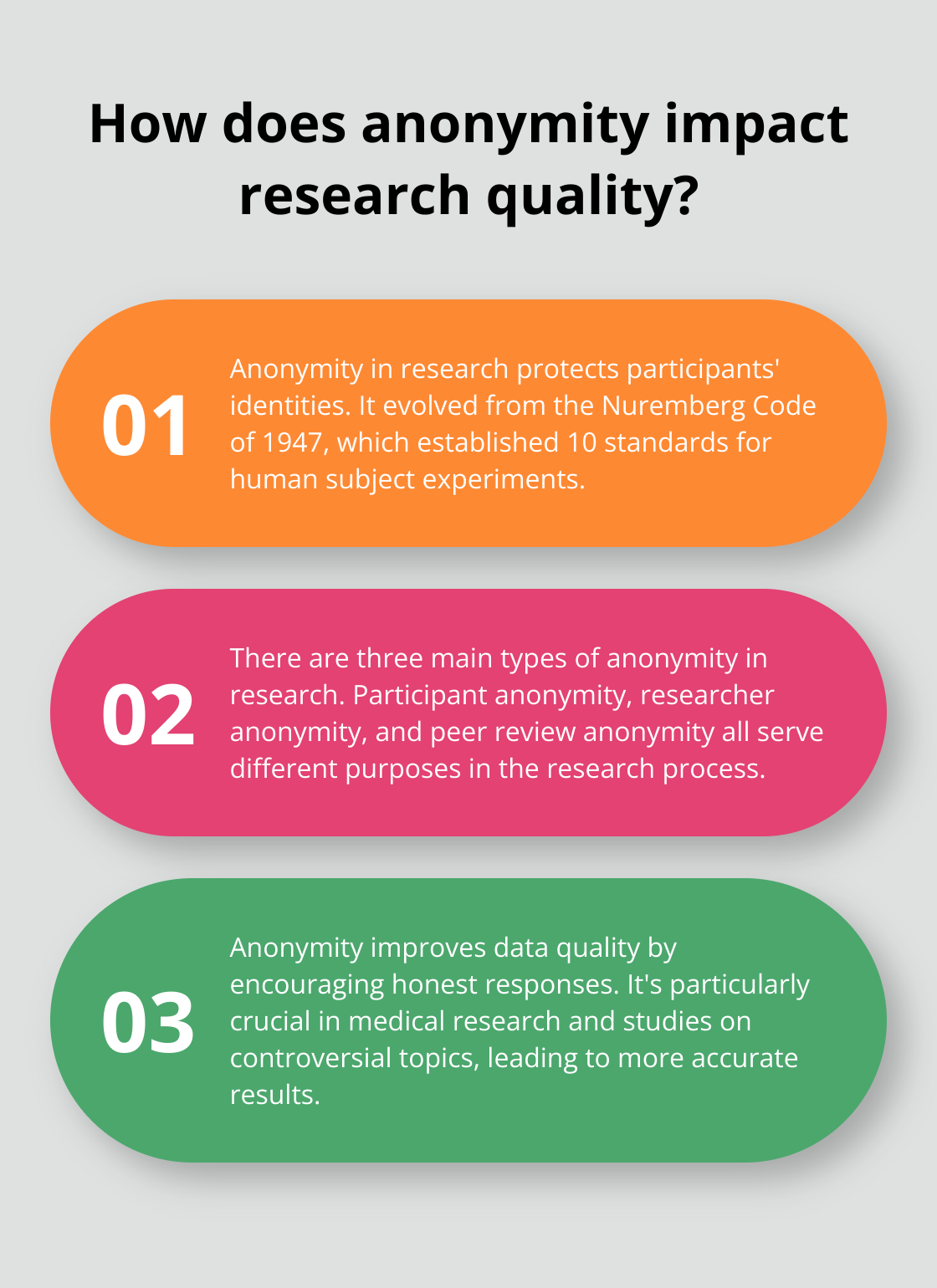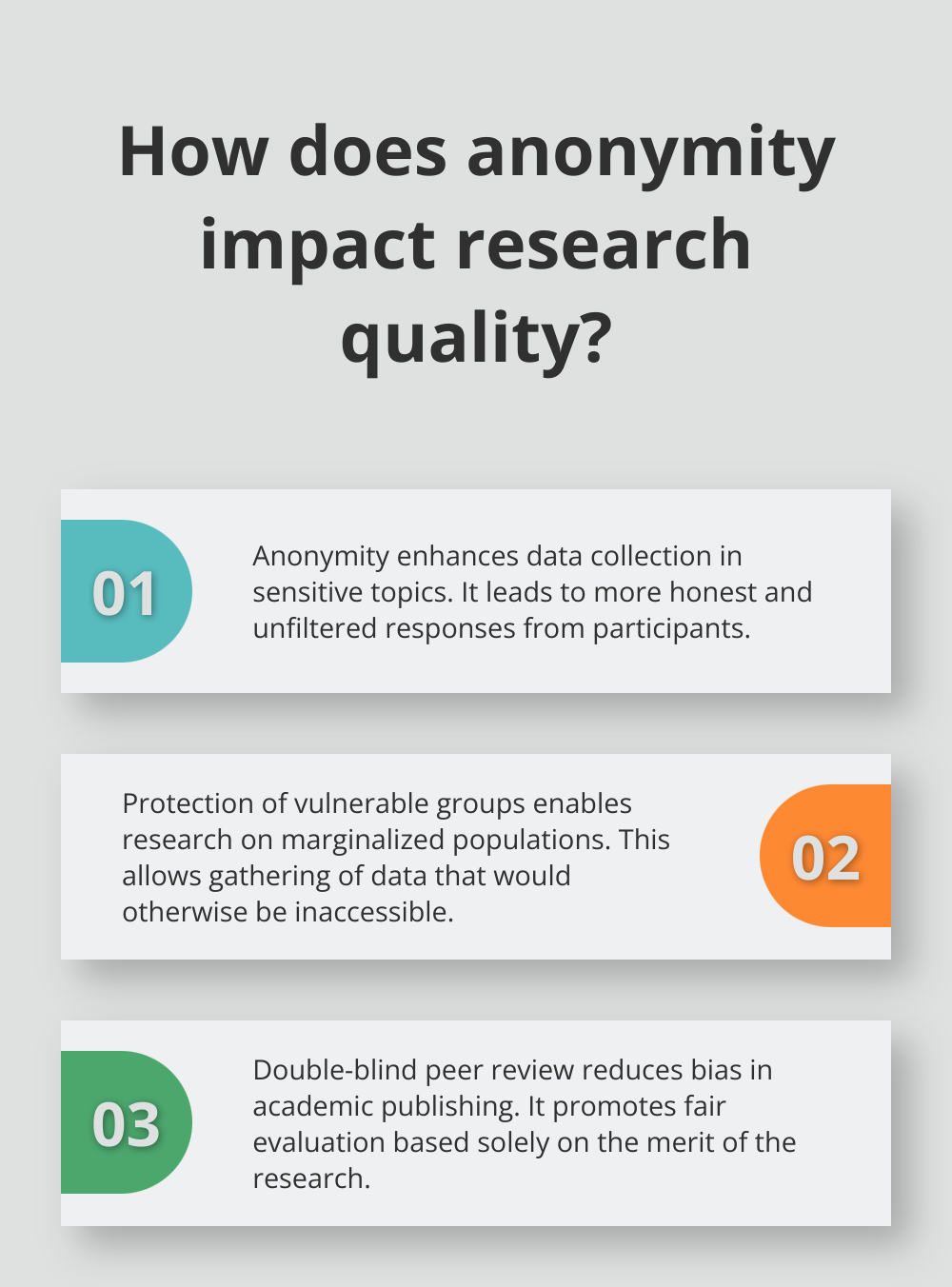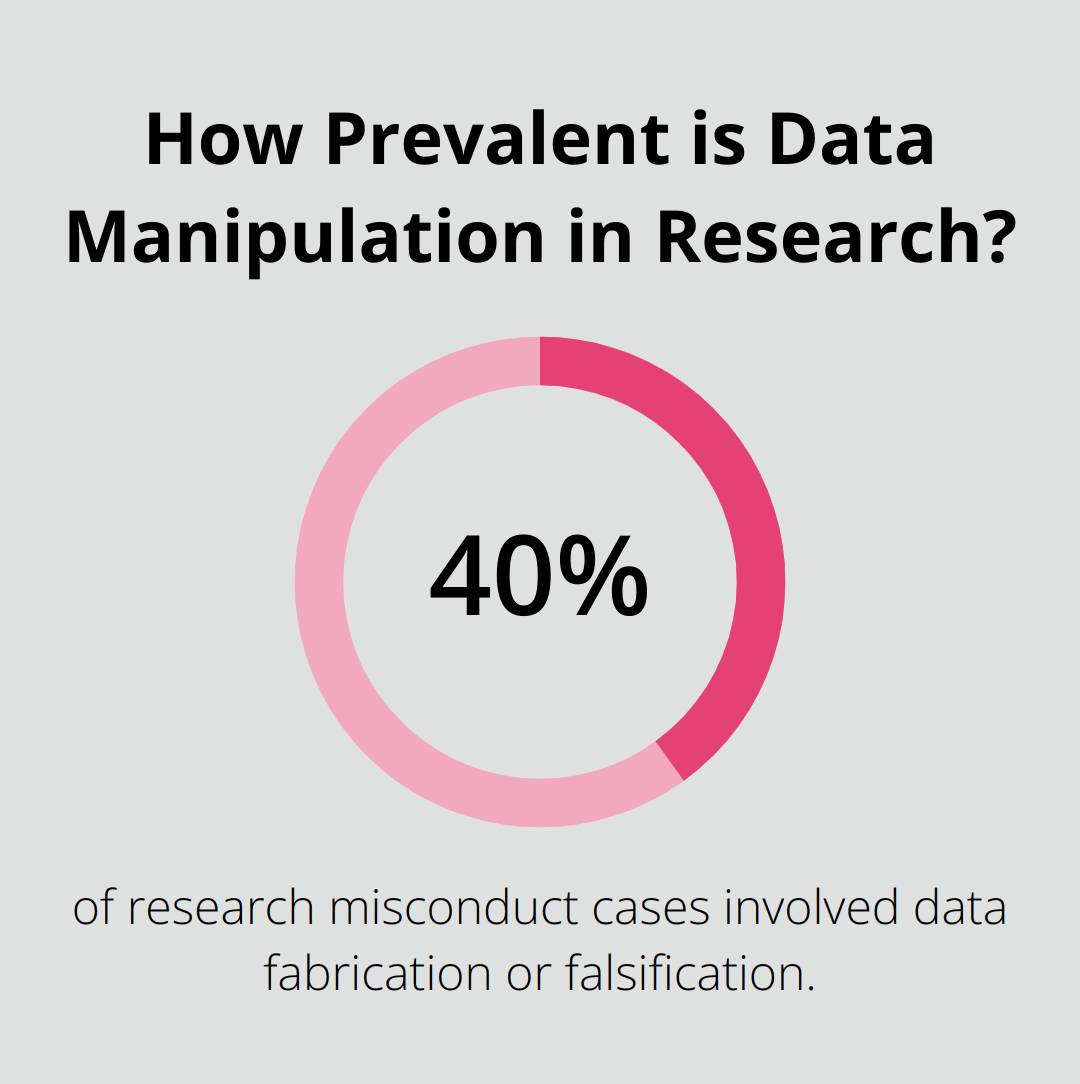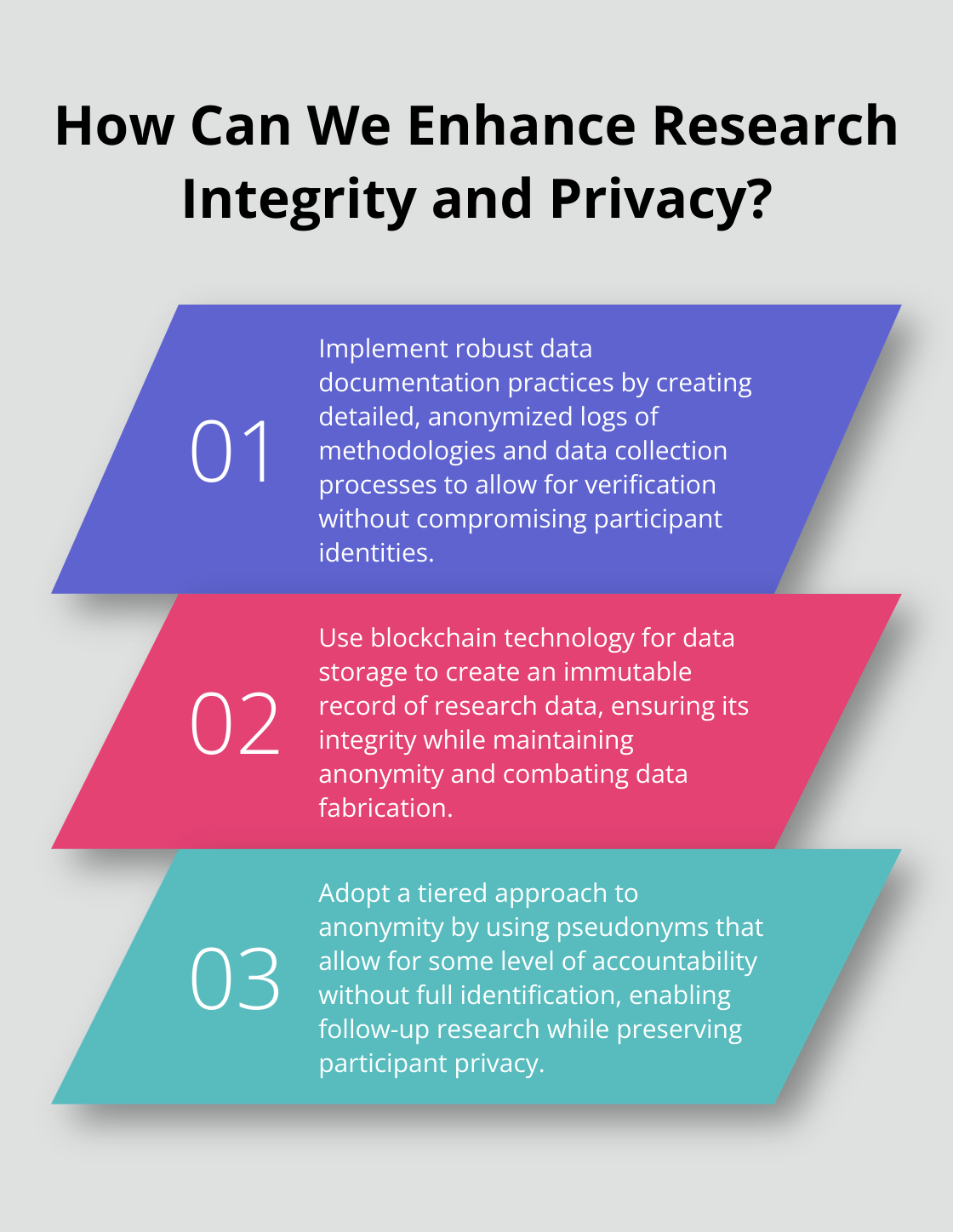How Anonymity Enhances Research Integrity
At Piter, we’re fascinated by the power of anonymity in scientific research.
Anonymity plays a crucial role in maintaining research integrity, from protecting vulnerable participants to reducing bias in data analysis.
The benefits of anonymity in research are far-reaching, impacting everything from data collection to peer review processes.
What is Anonymity in Research?
Anonymity in research serves as a powerful tool that protects participants and enhances the quality of data collected. At its core, it keeps the identity of research subjects unknown. This practice has evolved significantly over time.
The Evolution of Anonymous Research
In the early days of scientific inquiry, anonymity wasn’t a priority. However, as research ethics developed, protecting participants became paramount. The Nuremberg Code of 1947 laid down 10 standards to which physicians must conform when carrying out experiments on human subjects. This laid the groundwork for anonymous research practices.
Types of Anonymity in Research
Research today uses several forms of anonymity:
- Participant Anonymity: This most common form removes all identifying information about subjects. For instance, a study on workplace satisfaction might assign random numbers to employees instead of using their names.
- Researcher Anonymity: Sometimes, researchers conceal their identity to prevent bias. This proves useful in certain scenarios, like studying sensitive political topics.
- Peer Review Anonymity: Academic publishing often uses double-blind peer review. Proponents suggest that it is a more impartial process that limits biases and results in higher quality peer reviews.
Practical Applications of Anonymity
Medical research relies heavily on anonymity. A study on HIV treatments might use coded identifiers to protect patients’ privacy while still collecting vital data. This approach encourages participation and honest responses.

Social science researchers often employ anonymity when studying controversial topics. For example, a survey on political views conducted anonymously often yields more truthful answers.
The Impact on Data Quality
Anonymity in research isn’t just about protection – it improves data quality. When people feel safe, they share more honest, unfiltered information. This leads to more accurate results and, ultimately, better scientific understanding.
Anonymity in Online Environments
The concept of anonymity extends beyond traditional research settings. In the online world, platforms like Wolfbet (a top online crypto gambling platform) implement no-KYC poker policies, reflecting a commitment to user privacy similar to anonymity in research contexts. This approach not only protects users but also creates an environment where they can engage more freely.
As we explore the benefits of anonymity in research integrity, we’ll see how this fundamental principle shapes the quality and reliability of scientific findings.
How Anonymity Enhances Research Quality
Unbiased Data Collection
Anonymity in research transforms the quality and reliability of scientific findings. When participants know their identities remain protected, they provide more honest, unfiltered responses. This proves especially true for sensitive topics. Anonymous reporting of wrongdoing has precedents in the public and private sectors, but its utility has been overlooked. Decreasing the threat of retaliation can lead to more accurate and comprehensive data collection.
Protection of Vulnerable Groups
Research on marginalized or at-risk populations becomes possible only when participants’ identities stay shielded. This protection allows researchers to gather data (which can inform policy and support services) that would otherwise remain inaccessible. For example, studies on LGBTQ+ youth in conservative areas rely heavily on anonymity to ensure participant safety and data accuracy.
Enhanced Peer Review Process
Double-blind peer review, where both authors and reviewers remain anonymous, reduces bias in academic publishing. Proponents suggest that it is a more impartial process that limits biases and results in higher quality peer reviews. This levels the playing field and promotes fair evaluation based solely on the merit of the research.
Improved Data Quality
Anonymity doesn’t just protect identities; it uncovers truths that might otherwise remain hidden. When people feel safe from potential repercussions, they share more accurate and comprehensive information. This leads to higher quality data and more robust research outcomes.
Parallels with Online Privacy
The concept of anonymity in research mirrors privacy-focused approaches in other domains. For instance, Wolfbet (a top online crypto gambling platform) implements a no-KYC poker policy, ensuring user privacy. This commitment to anonymity not only protects users but also creates an environment where they can engage more freely – a principle that holds true in both research and online gaming contexts.

As we explore the challenges and limitations of anonymous research in the next section, we’ll see how researchers balance the benefits of anonymity with the need for transparency and accountability.
Navigating the Challenges of Anonymous Research
The Verification Dilemma
Anonymous research presents a significant challenge in verifying data sources and methodologies. Without clear attribution, researchers find it difficult to cross-check information or replicate studies.

To address this issue, researchers should implement robust data documentation practices. Creating detailed, anonymized logs of methodologies and data collection processes allows for verification without compromising participant identities.
Combating Data Fabrication
The potential for misuse or fabrication of data increases with anonymity. A report from the Office of Research Integrity uncovered that 40% of research misconduct cases involved data fabrication or falsification.
Institutions should implement rigorous peer review processes to mitigate this risk. The use of blockchain technology for data storage can create an immutable record of research data, ensuring its integrity while maintaining anonymity.
The Transparency Tightrope
Striking a balance between anonymity and accountability presents a complex challenge. Excessive anonymity can erode trust in research findings, while insufficient anonymity may compromise participant safety.
A tiered approach to anonymity offers a potential solution. Researchers can use pseudonyms that allow for some level of accountability without full identification. This method has proven successful in long-term sociological studies, preserving participant privacy while enabling follow-up research.
Ethical Considerations
Maintaining anonymity raises several ethical questions (e.g., ensuring informed consent, handling conflicts between anonymity and the duty to report harmful behavior). Researchers must develop clear ethical guidelines specific to anonymous research. These guidelines should address issues such as data retention, participant withdrawal, and protocols for breaking anonymity in extreme circumstances.
Parallels with Online Privacy
The challenges of anonymity in research mirror privacy concerns in other domains. Wolfbet, a top online crypto gambling platform, implements a no-KYC poker policy to ensure user privacy. This commitment to anonymity not only protects users but also creates an environment where they can engage more freely – a principle that holds true in both research and online gaming contexts.
Final Thoughts
Anonymity in research strengthens scientific integrity and improves the quality of findings. It creates an environment where participants provide honest, unfiltered responses, especially in sensitive research areas. The benefits of anonymity in research extend to peer review processes, where double-blind reviews promote fair evaluation based solely on merit.

Researchers must navigate challenges to balance verification and transparency with identity protection. They need to implement robust data documentation practices and leverage technologies like blockchain to ensure data integrity while maintaining anonymity. Clear ethical guidelines must address the complexities of informed consent and potential conflicts between anonymity and reporting obligations.
Piter recognizes the parallels between anonymity in research and privacy in online environments. Our platform, Wolfbet, reflects this commitment through our no-KYC poker policy (creating an environment where users can engage freely and securely). As we move forward, anonymity principles will continue to shape both the research landscape and the digital realm.



